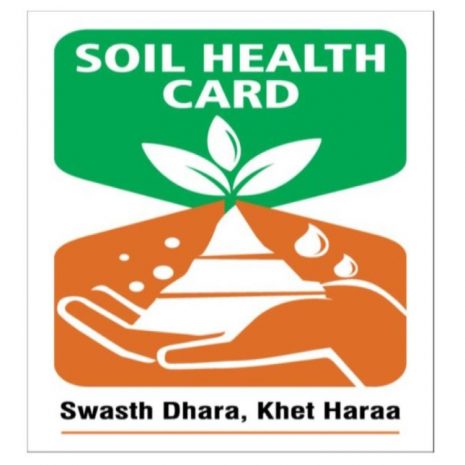
Soil health card boosts farm income up to Rs 30K/acre depending on crops: Study
PTI, Feb 17, 2020, 2:21 PM IST

New Delhi: Use of soil health card has helped farmers reduce substantially the cost of production and achieve higher production, thereby increasing farm income up to Rs 30,000 per acre, depending on the crop, according to a latest government study.
The study, conducted by the National Productivity Council (NPC) in 76 districts of 19 states – covering 170 soil testing labs and 1,700 farmers, has been released on the completion of five years of the government scheme.
Soil health card provides information to farmers on nutrient status of their soil along with recommendation on appropriate dosage of nutrients to be applied for improving its health and fertility.
“In absence of the soil health cards, it was acknowledged by the farmers that adequate quantity of fertilizers and micro-nutrients were not being applied by them earlier and this had affected the productivity of crops,” the study said.
According to the study, savings on fertilisers and increase in production led to increased income of the farmers.
For instance, there was Rs 25,000-30,000 per acre increase in income from tur, around Rs 25,000 per acre from sunflower, Rs 12,000 per acre from cotton, Rs 10,000 per acre from groundnut, Rs 4,500 per acre from paddy and Rs 3,000 per acre from potato, it said.
Application of fertilisers as per the recommendation of soil health cards led to savings in nitrogen fertilisers like urea, thereby resulted in a reduction in the cost of cultivation.
In the case of rice, the cost of cultivation was reduced by 16-25 per cent and savings of nitrogen was found to be around 20kg/acre. In pulses, there was a 10-15 per cent reduction in cultivation cost and savings of 10kg/acre urea.
Similarly in oilseeds, the reduction was 10-15 per cent and savings on nitrogen was 9kg/acre in sunflower, around 23kg/ acre in groundnut and around 30 kg/acre in castor.
Among cash crops, the reduction in cotton was 25 per cent and savings on nitrogen fertiliser was around 35 kg/acre, while in potato the saving on nitrogen fertiliser was 46 kg per acre, the study added.
Stating that judicious use of fertilisers also resulted in increased production of crops, the study showed that there was a 10-20 per cent increase in production of paddy and 10-15 per cent in wheat and jowar.
There was 10-30 per cent rise in production of pulses, 40 per cent jump in oilseeds and 10-20 per cent in cotton production, it said.
Under the scheme, soil health card is issued farmers every 2 years so as to provide a basis to address nutritional deficiencies in fertilization practices. Since the launch of the scheme, the card has been issued twice.
In the first cycle from 2015 to 2017, 10.74 crore soil health cards were distributed to farmers. In the cycle-II (2017-19), 11.69 crore soil health cards have been distributed to farmers across the country.
Instead of sample collection at the grid level, the government has started a pilot project from this fiscal onwards to collect samples at ‘individual farm holding.’
Under the pilot, one village per block is adopted for land holding-based soil sampling, testing and organisation of larger number of demonstrations up to a maximum number of 50 demonstrations (1 hectare each) for each adopted village.
So far, 6,954 villages have been identified by the states in which against the target of 26.83 lakh samples, 20.18 lakh samples have been collected, 14.65 lakh samples have been analyzed and 13.54 lakh cards have been distributed to farmers, the government said.
Apart from this 2,46,968 demonstrations and 6,951 farmer melas have been approved for states and union territories.
The government also mentioned that the soil analyzing capacity in the country has increased from 1.78 crores to 3.33 crore samples per annum in a short period of five years.
So far, 429 new static soil testing labs (STLs), 102 New Mobile STLs, 8752 Mini STLs have been provided. Village level soil testing facilities (VLSTLS) by agri-entrepreneurs have also been promoted and so far 1,562 VLSTLs have been sanctioned and strengthening of 800 existing STLs have been approved to states/UTs under the scheme.
Soil health card provides two sets of fertiliser recommendations for six crops, including recommendations of organic manures. Farmers can also get suggestions for additional crops on demand. They can print the card on their own from soil health card (SHC) portal.
SHC portal has farmers database of both the cycles and is available in 21 languages for the benefit of the farmers.
Udayavani is now on Telegram. Click here to join our channel and stay updated with the latest news.
Top News

Related Articles More

Sony India bags ACC media rights for eight years

Musk says X now top news app on App Store in India

Air India to offer integrated aircraft maintenance engineering programme

Markets stage sharp recovery; Sensex reclaims 79k level, Nifty surges 557.35 points

Baku climate talks: The ‘X’ factor that could determine future of Global South
MUST WATCH
Latest Additions

Air pollution: SC flags Delhi govt’s failure to implement GRAP-4 curbs on entry of trucks

Drugs worth Rs 6 crore seized in Bengaluru, five arrested

Siddaramaiah urges Nirmala Sitharaman to address NABARD’s loan cuts to farmers

Satwik-Chirag enter semifinals, Lakshya loses to Antonsen in China Masters

BJP stages protest against Congress govt in Karnataka over Waqf properties row
Thanks for visiting Udayavani
You seem to have an Ad Blocker on.
To continue reading, please turn it off or whitelist Udayavani.





















